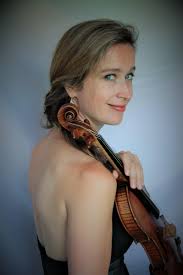by Stephanie Manning

“To get to continue doing that in some form is enormous.” With her time in Erie now behind her, she is focusing on her next performance, a live streamed recital on November 19th sponsored by the Local 4 Music Fund.
The three composers and their pieces on the program are all well-known, but familiarity was the goal. She and her collaborator, pianist Eric Charnofsky, chose works “that would be personally challenging and satisfying for us to play and hopefully a joy for the audience to hear.”
The opener, Mozart’s K. 304, is one of more than thirty sonatas the composer wrote for the violin. Unusually, this is his only violin sonata in a minor key, which seemed an appropriate choice for our current times. This will be Cornelius’ first time performing the piece, but she knows it well thanks to repeated listenings. “It’s really brooding, dark, and kind of nostalgic sounding, but it definitely has Mozart’s signature joy and lightness,” she said.
The other two pieces are rich with memories for the violinist. The closer, Suite italienne, is one of many arrangements of music from Stravinsky’s ballet Pulcinella. The Pulcinella Suite was her first piece as concertmaster at Oberlin Conservatory, a memorable experience that was simultaneously nerve-wracking and exciting. When she discovered Suite italienne, she was immediately charmed: “To this day, I can’t really listen to it or play it without laughing. It is so cute and goofy and inventive.”
On the other hand, Beethoven’s Kreutzer sonata has always been a part of Cornelius’ life. “It’s one of my mother’s favorite pieces, so I definitely heard it a lot growing up,” she said. Because it’s quite a difficult piece, it wasn’t until her graduate recital at New England Conservatory that she performed it for the first time. She hasn’t approached the Kreutzer since, making her excited to revisit it. “Props to Eric for agreeing to do this sonata with me,” she added. “It is a monster piano part!”
Though she and Charnofsky haven’t yet started rehearsing this specific program, the two have collaborated together in the past for chamber music and solo recitals. She is full of praise for his performing, composing, and teaching ability and notes their similar sense of humor and work ethic. That strong working relationship is integral to the performance, especially given the prominent piano parts characteristic of these sonatas. “He’ll show up super prepared, but also ready to be completely flexible with what I’m thinking with the music,” she said. “He’s just a pleasure to work with.”
This will mark Cornelius’ second appearance this year on a concert sponsored by Local 4. In April, she livestreamed a solo recital from her home over Facebook. Managing the broadcast by herself was stressful, but nevertheless she enjoyed interacting with the audience online. This time around, a professional crew at Steinway Gallery will be managing the technical aspects, allowing the two performers to focus only on the music.
The recent necessity of online performance has affected Cornelius not just as a performer, but also as a teacher –– lessons with her fifteen students are being conducted remotely. The adjustment to new technology has been a lot to process, but seeing her students each week is both refreshing and reassuring. “I teach a lot of kids, and they’re a big part of my life,” she said. “It really gives me hope to see from week to week how resilient and creative they are in dealing with these challenges.”
The pandemic has brought out another creative side of the violinist. She’s been regularly making videos with the Acapella app, creating humorous arrangements of well-known tunes both from the classical repertoire and pop culture. At first, she only sent them to her friends, but their enthusiasm encouraged her to start posting them on Facebook and YouTube. Many of her videos involve more than just violin: past additions include a cowbell, spoons, glassware, and even some carefully staged haircutting––set to The Barber of Seville, of course.
Humor is a part of Cornelius’ personality she never would have shared in public before, but she said a good laugh is something we all need now more than ever. Her blend of music and humor is an effective exercise in escapism, and that’s what it’s all about: “If I can offer that to people, even if it’s just 30 seconds, that makes me so happy.”
Published on ClevelandClassical.com November 12, 2020
Click here for a printable copy of this article


